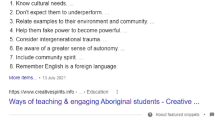Abstract
Young children enjoy studying about other cultures when they experience them in a concrete, hands-on manner. Cross-cultural study by young children should encourage them to experience a culture from an indigenous child's viewpoint. Learning facts and information about a culture is less important than experiencing how children from other places might play a game or what they might eat for dinner.
Similar content being viewed by others
Resources for teaching
Professional Resources
Abrahams, R. D. (1983).African folktales: Traditional stories of the black world. New York: Pantheon.
Ayisi, E. O. (1986).An introduction to the study of African culture. London: Heinemann.
Banks, J. A. (1981).Multiethnic education — Theory and practice. Boston: Allyn & Bacon.
Bunge, F. M. (Ed). (1980).Thailand, a country study (5th ed.) Washington, DC: Headquarters, Department of the Army.
Chase, R. (1967).Singing games and playparty games. New York: Dover.
Chu, V. (1968).Thailand today. New York: Crowell.
Girling, J. L. S. (1981).Thailand, society and politics. Ithaca, NY: Cornell University Press.
Hunter, I., & Judson, M. (1977).Simple folk instruments to make and play. New York: Simon & Schuster.
Omer-Cooper, J., Ayandele, E., Afigbo, A., Gavin, R. (1968).The growth of African civilization: The making of modern Africa. London: Longman.
Smith, H. E. (1976).Historical and cultural dictionary of Thailand. Metuchen, NJ: Scarecrow Press.
Sunal, C. S. (1988). Studying another culture through children's games: Examples from Nigeria.The Social Studies, 79 232–238.
Willson, R. B. (1966).Musical instruments. New York: Henry A. Walck.
Wyatt, D. K. (1984).Thailand: A short history. New Haven: Yale University Press.
Materials for Children
Aardema, V. (1970).Ji-mongo-mongo means riddles. New York: Four Winds. (A delightful collection of riddles taken from 11 African tribes. Beautifully detailed illustrations bring Africa to life.)
Courlander, H., & Eshugbayi, E. (1968). The king's drum and other African tales, inOlode the hunter and other tales from Nigeria. New York: Harcourt Brace Jovanovich.
D'Amato, A., & D'Amato, J. (1970).African crafts for you to make. New York: Julian Messner.
Gaer, J. (1954).The adventure of Rama. New York: Little, Brown. (The Ramakien is a popular epic in Thailand telling stories of the adventures of it's hero, Rama. It is also known asThe Ramayana.)
Gilroy, T. (1979).In Bikole: Eight modern stories of life in a West African village. New York: Knopf.
Mason, J. (Ed.) (1977).The family of children. New York: Ridge Row Press, Grosset & Dunlap.
Palmer, H. (1970).Folk song carnival. 33 1/2 recording, AR524 Freeport, NY: Educational Activities.
Seeger, E. (1969).The Ramayana. New York: Young Scott.
Spier, P. (1980).People. New York: Doubleday.
Yarbrough, C. (1979).Cornrows. New York: Coward-McCann. (Past and present mingle in this discussion of a hairstyle.)
References
Ehman, L. H. (1980). The American school in the political socialization process.Review of Educational Research, 50 99–119.
Jones, R. S. (1980). National vs. international learning: Political knowledge and interest in the USA.International Journal of Political Education, 3 (1), 33–47.
Stone, L. (1986). International and multicultural education. In V. A. Atwood (Ed.), Washington, DC: National Council for the Social Studies.
Torney-Purta, J. (1982a). Research and evaluation in global education: The state of the art and priorities for the future. Paper presented at the Conference on Priorities in Global Education, Easton, MD.
Torney-Purta, J. (1982b). Socialization and human rights research: Implications for teachers. M. Branson & J. Torney-Purta (Eds.),International human rights, society and the schools. Washington, DC: National Council for the Social Studies.
Additional information
Cynthia Szymanski Sunal is a professor of early childhood education and a social studies specialist at the University of Alabama. Barbara Gibson Warash is a clinical Associate Professor and Director of the Laboratory Preschool at West Virginia University.
Rights and permissions
About this article
Cite this article
Sunal, C.S., Warash, B.G. From a child's point of view: Studying Thailand and Nigeria. Early Childhood Educ J 19, 4–8 (1992). https://doi.org/10.1007/BF01617074
Issue Date:
DOI: https://doi.org/10.1007/BF01617074




